 SCANDAL: THE EVIDENCE
SCANDAL: THE EVIDENCE
As follows are a select group of documents relating to this scandal. Corrupt government employees have conspired with corporate officers to engage in a pattern of waste, fraud, and abuse in order to advance their careers while defrauding the American taxpayer.
But don't take my word for it. Take their word for it.
I got charged and in January 2016, convicted by the Federal Government, even though I never committed a crime. This could happen to you!
A for-profit corporation played the victim and told the FBI I violated the hidden terms and conditions of their corporate website, even though I didn't break any laws. Further,
- The victim* MADE MONEY on every transaction. Nobody lost any money.
- By their own admission, the government had no case without EVIDENCE they FABRICATED. In fact, they can't even agree among themselves on where it came from.
- The government's star witness* BLACKMAILED me, with the FBI's and DOJ's knowledge, coordination, and complicity.
- The government's star witness* LEAKED detailed personal information about unrelated customers, including full names, addresses, phone numbers, email addresses.
Thousands of records, possibly including YOUR PERSONAL INFORMATION, were made available as part of this case's public record, with the full support and supervision of the FBI and the US Attorney's Office. - The list goes on... you can read the story and see the evidence here.
- Read the FAQ here.
EXHIBIT A
The victim* MADE MONEY on every transaction. Nobody lost any money.During the time in question, the victim* had a great little scheme going. Inkjet printers use cartridges, and those cartridges are expensive. Everybody knows they're expensive, and inkjet printer manufacturers lose money on the printers to make it up on the cartridges. And oh how they make it up. Printer cartridges often run north of $50 for a few thousand pages' worth. It didn't take long for everybody to get in on a new industry- cartridge refilling. Everybody eventually got into the action, first from mail-order kits, to even franchises like Cartridge World, where they'd refill the tank part of the cartridge with fresh brand X ink, rebox it and resell it, at maybe half the cost of a new cartridge.
Well, big name manufacturers like HP and Lexmark don't like that. Every cartridge refilled is a new cartridge unsold, and new cartridges were almost pure profit. So they met with big box stores to set up a bounty system, where if they could entice customers to "turn in" ink cartridges, they'd be paid a bounty, whereby HP and Lexmark would collect and "recycle" the cartridges ("crush" would be more apt), taking them off the market, and leaving no empties for competitors (or customers) to refill. The big box stores would offer a portion of that bounty as store credit for turning in the cartridges, usually $3 for each during the time in question.
The victim* wasn't happy with this arrangement, because although manufacturer bounties were good, there was more money to be made in refilling. They partnered with an outfit that would refill cartridges, the victim* sent them empties collected from their customers, then they'd buy back the refills and then turn around and sell them. To get the public to participate, the victim* offered $3 off any purchase per cartridge turned in for the refill. They buy a cartridge for $3 in credit (which almost certainly cost them less than $3 to sell), and then in about a month, they put the same cartridge on the shelf for $45 in company packaging, instead of the $59 new one next to it. Most of that $45 is profit, given that a typical refill through a retailer costs under $10.
The refilling business strategy had a drawback. Some cartridges were little more than plastic boxes, without any electronics at all, and were dirt cheap to produce new. There was no point in offering $3 for any and everything that looked like a cartridge, so the victim* became very strict. They'd take any cartridge, but would only offer the $3 discount if the cartridges were name-brand, "virgin" (never been refilled), had printheads, were clean, not too old, and in full working order. Employees of the victim* were required to ensure that every cartridge turned in for a credit followed these requirements. The "virgins" would be packed carefully and the junk would be thrown in a box and both would be shipped off to their partner. Even though they paid store credit for the virgins and not for the junk, they collected a lot more pieces of junk.
Another industry popped up- bulk used ink cartridges via mail-order. You could buy lots of 50, 100, 1000 cartridges of varying quality on eBay. I can't say with certainty where they all came from, but there were (and still are) lots of sellers with lots of inventory. "Junk" or "Non-virgin" would run around $0.20 in bulk and "virgins" often more than $0.80, though many lots were mixed or of undetermined nature.
The prospect of store managers facing entrepreneurs bringing in truckloads of empty cartridges made corporate shudder, so they tried to limit the rate of uptake of cartridges. First (2007) they limited to 5 per person per day. Next (2009) they wouldn't pay you right away, but would make you use their rewards card and wait a month, though the limit was now 10 per person per month. Next (2010) they added a requirement that not only did you have to wait a month, you had to buy something in addition, using the card, with additional money, to get paid for your turned-in cartridges, with a limit of 20 per person per month.
The government's star witness* really wanted the FBI to go after me, but as anyone who ever reports fraud to the FBI knows, they will not pursue a case unless it meets a magic minimum: $100,000. So the star witness decided to falsely report the amount paid out as a loss and pretend there was no gain from it, to get the number over $100,000. The government's star witness* expected that the FBI agent and US attorney would be dumb or corruptible enough to fall for it (they were). Then, the government's star witness* took the stand and lied to the judge and jury, saying they lose money on their cartridge program:
Now remember, when you buy a new ink cartridge, even in the victim*'s store, in with it comes a postage-paid pouch you can send in the old cartridge to the manufacturer for free. How on Earth would a retailer be helping the environment by diverting cartridges from free and convenient recycling, and paying money? Greenwashing.
Nonetheless, the jury bought it and convicted. However, after the trial, during the sentencing phase, the defense mustered the courage to seek a subpoena from the victim* seeing exactly how much money they made on the ink recycling program. Guilt was not up for discussion, but money was, and it's not up to a jury how much the government says you owe. The judge actually granted it.
Now, the victim* suddenly stopped cooperating. Thousands of hours of cooperation between US Attorney's Office, FBI and victim*, and now, they hire the biggest local law office they can find to tell the judge to buzz off. Where's the love, man?
They fired off a 11-page motion to quash (stop) the subpoena with the judge. Here's some highlights: (9/2/16):
(Victim* in brown, brick red highlight I added)
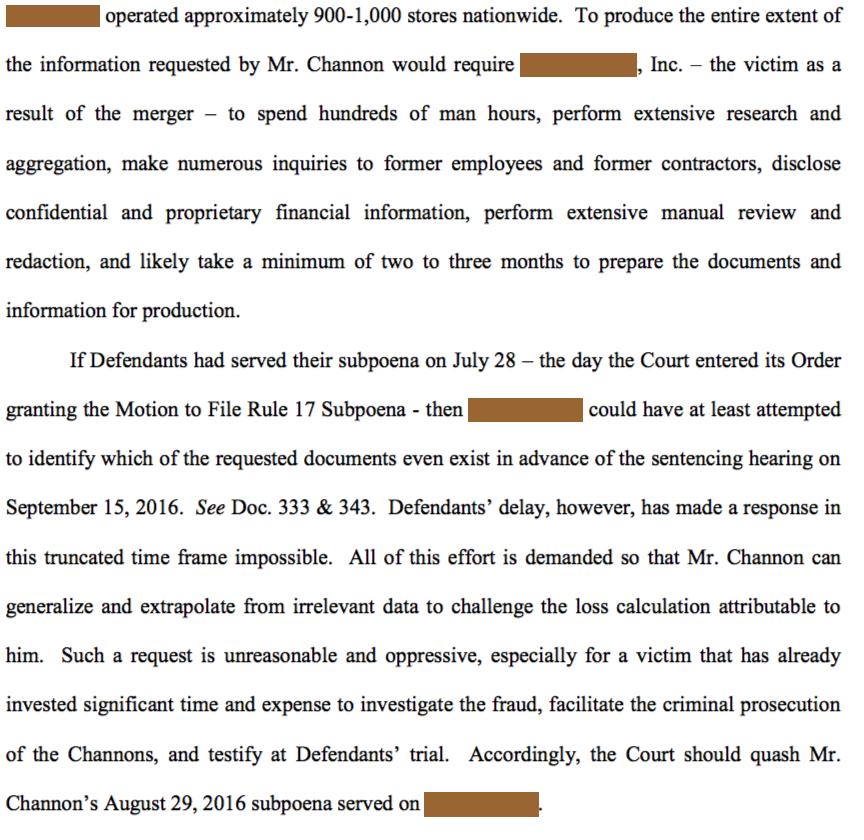



The judge denied the law firm's motion. Finally, the next day, they submitted 13 pages, most of which were blacked-out, disclosing very little information:
(Page 11 from the disclosure. Wonder how many employees they needed for this page. Also, how many hundreds of dollars and days' worth of work.)
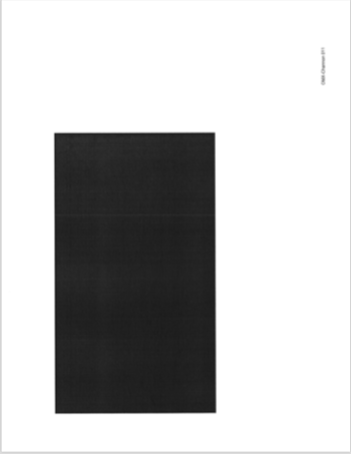
As you can see here, even kicking and screaming, the evidence that they made money off ink recycling "private label ink" is incontrovertible:
(Page 13 from the subpoenaed disclosure:)
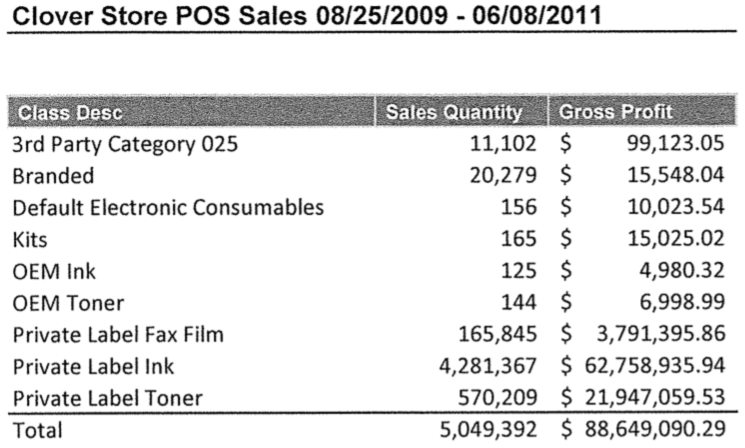
In the end, even if I dropped off 27,853 ink cartridges like they say I did, the numbers work out like this:
Victim*: + $204,023 (27,853 cartridges, 50% yield, at $14.65 profit per)
- $ 82,749 (27,853 cartridges at $3 paid out per)
____________
+ $ 121,274 profit
At the 9/28/16 sentencing hearing, the prosecutor and the star witness* desperately tried to spin the numbers to make the math somehow work that the victim* had lost money on the deal, or that the actual amount couldn't possibly be determined:
(star witness* under oath in yellow, victim* in brown, attorney from our side in cyan)

More of this razzle-dazzle:
(main prosecuting attorney in red, victim* in brown, accounting expert witness under oath in purple)

Even though their logic was more tortured than a guantanamo detainee, the district judge bought their smokescreen. According to the judgment, I not only have to pay ~$100,000 more to the victim* (because otherwise they would have only doubled their money), but also pay the government ~$100,000 (because somehow that's not a shakedown to have to pay the same amount twice). We won't even go into where that funding goes (FBI salaries and bonuses). And all those ink cartridges? Well, the victim* gets to keep those too.
Some might say the victim* didn't want anybody to know that I'd made them twice as much money as they alleged I'd defrauded them of, because then that could subject them to malicious prosecution, obstruction of justice, and criminal racketeering charges, just for starters. Judge for yourself.
EXHIBIT B
By the time trial started, the lawyers and the judge had already spent days in court only arguing about whether the government could present their spreadsheets as originals and whether they could be trusted.Many months prior, we had even gotten ready to seat a jury:
But then my public defender brought up an excellent point about the law, and the judge cancelled the trial in order to think about it. It almost looked like the trial would get cancelled altogether. I can't describe how it feels to watch a prosecutor squirm, elbows on desk, head in hands, on the edge of tears. This prosecutor in particular. Think Tracy Flick from Election.
Months went by, and even as the issue lay unresolved, the judge decided the trial would move forward, and I got a new, far less friendly jury pool.
Two days before trial, we have a hearing, and my attorneys finally land what should've been a fatal blow:
(1/11/16 Evidentiary Hearing, Government's star witness* in yellow, one of our attorneys in blue)
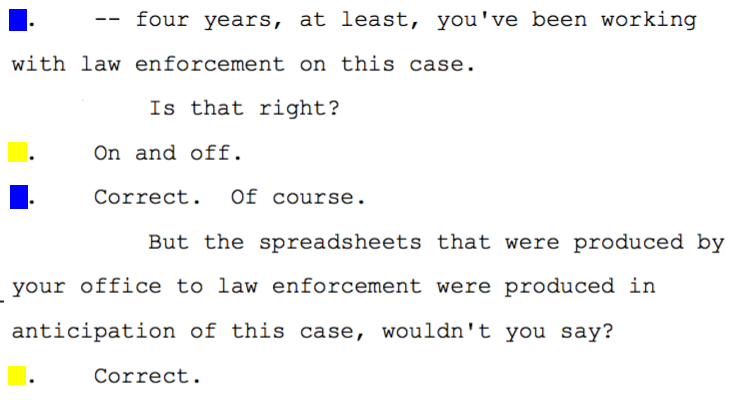
This should have been the government's star witness handing the courtroom a dismissal on a silver platter, because those spreadsheets WERE their case, their underlying data
kept getting withheld after multiple requests from the defense, and previous court decisions hinged on proving what the star witness* just volunteered.
But we weren't before a law professor. Instead, no resolution. Two days pass. Then at the last minute, jury pool in the next room, the judge struggles mightily with the sketchy nature of the evidence.
This is highly irregular for a fundamental issue like this to go unresolved so close to a trial. It's like booking a once-in-a-lifetime flight around the world and two hours after you were supposed to be at the airport, struggling with what outfits to put in your suitcase.
The prosecutor on the case then utters something actually true:
Jury Selection, 1/13/2016:
With 70-100 jury pool members waiting in the next room, the judge still hasn't ruled on the admissibility of the evidence. Prosecutor #4 in orange:
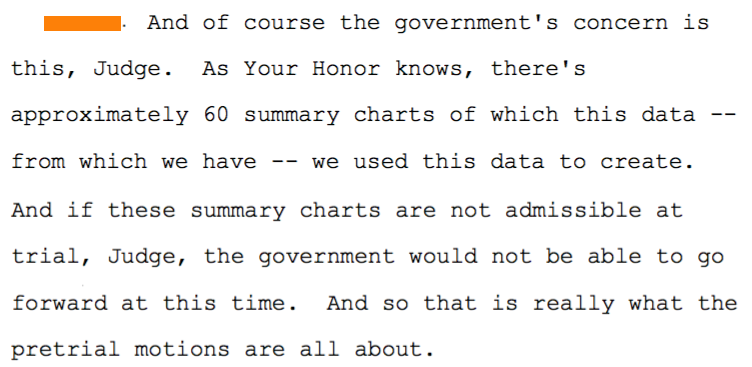
I can't tell you what went through the district judge's mind next, but I'm far from the only person who came up with the following theory, well-supported by the transcript:
The judge, highly deferential to the jury, finally decides it's not fair to them to have to keep waiting to be seated, and this is already the second jury, so we're going to have a trial, darnit.
So my defense team, half-certain there was not even going to be a trial, let alone one right then and there, got caught off-guard by the judge's sudden 180.
Let me tell you a brief story:
When I was 11 years old (1988), I made a science fair exhibit. My project was the only one that involved a computer, because computers were new. As part of it, there was some
printout stuck to the posterboard, and you could overhear various adults (teachers and parents) discussing the exhibit and printout among themselves, saying "that must be right", as if the computer made it infallible. Today it's hard to convice
people under 30, who
never knew a world without computers, that people this way could have ever existed. And for these people to exist today? Over the next 30 years, these people must have all died or gotten wise by now. Even your grandmother is on facebook and
knows to take what she sees with a grain of salt.
As a rare treat, and with the previous in mind, I'm going to release just a couple audio files of the actual appellate hearing at the 10th circuit of appeals, 11/16/2017. These are part of an exchange between the 10th circuit judges
(aged 77 and 70,
but they're smart, really smart, most forward-thinking, really, really hard-working, and classiest judges anywhere, of all time, believe me) and my lead attorney arguing the
case, less than 10 minutes in:
This is adorable when it's your grandpa (it may also remind you of your teenager). When it's the last guy standing between you and the bureau of prisons, and the last guy protecting every American's 6th amendment rights to confrontation, I'm curious.. what word would you use?
EXHIBIT C
Blackmail is not a word to be used lightly. Let's start with the federal statute: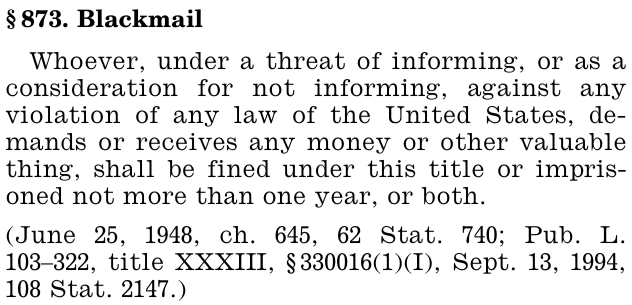
It's really simple. If you sell your silence, or offer to sell your silence, about something you truly believe to be a federal crime, you are committing blackmail. It doesn't matter if you feel you're owed the money, or whether selling your silence was the other guy's idea, or even whether the offer was a blatant lie (it was). You're not legally allowed to trade on the government's information, and it's punishable by a fine and up to a year in prison.
I don't know what's more frightening: the fact the punishment for blackmail is so weak (1 year max? people get murdered over blackmail all the time!), or the fact that almost nobody ever gets indicted with a blackmail charge.
The government's star witness* was kind enough to e-mail me a printed version of the blackmail, here for your review:
Victim* is brown, Government's star witness* is yellow, and brick red underlines are added.

In case you're worried that a lying witness jeopardized the investigation by keeping the FBI case agent in the dark, that's not what happened. A few days after the blackmail, he let the FBI agent know. The FBI agent knew it was wrong, and
informed the prosecutor. See for yourself:
(Sorry for the technicolor, but here goes. Magenta is the first FBI case agent, red is the lead prosecutor, purple are FBI higher-ups, brown is the victim*, yellow is the government's star witness*, and gray was on it when I found it)
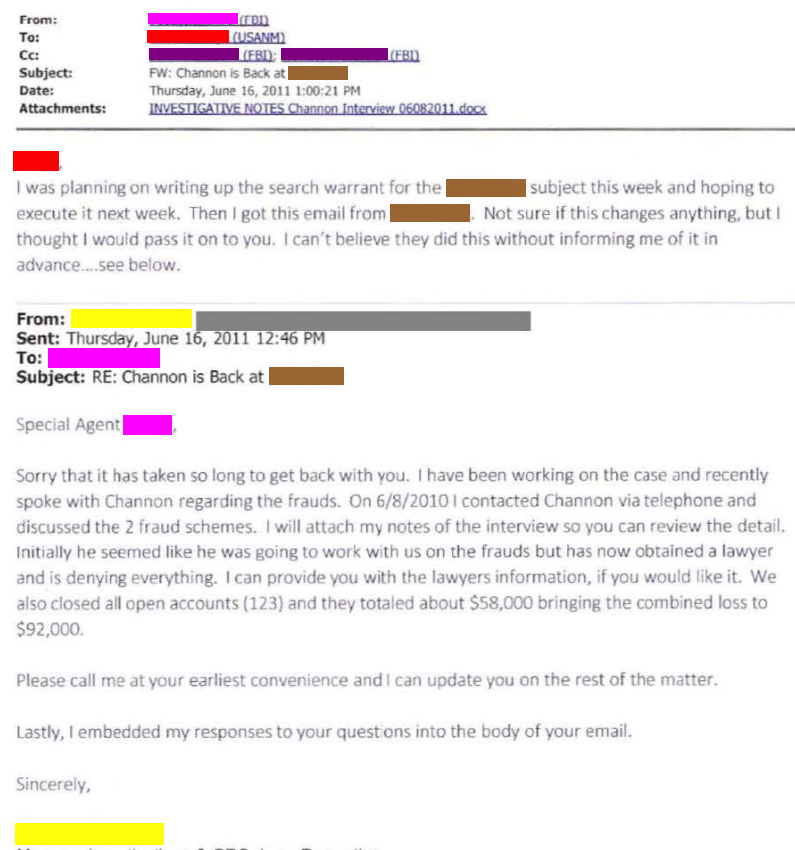
By the way, this last email was furnished to us days into the trial, far too late to use it for our defense.
The FBI case agent coordinated with the blackmail attempt by postponing the surprise search and seizure at my residence by 1-2 weeks.
I just had a thought. Isn't it the slightest bit curious that a Chicagoland-based company would go to all the trouble of contacting a faraway FBI office when they have a perfectly good one 20 minutes away? When was the last time you heard of a fraud case where the victim went to the defendants' home turf, rather than forcing the reverse? I think they did go 20 minutes down the road but those FBI agents didn't fall for their trickery. Forum shopping for a criminal case? Not unheard of, but it's usually a prosecutor doing it, not a victim*.
EXHIBIT D
Most infuriating, to me, about the appeal? The continued lying by prosecutors to judges that a particular Excel spreadsheet is an original, authentic, computer-produced document. Let's talk about that Excel spreadsheet for a minute. One of the tabs looks like this:Notice the rows, with their widths arbitrarily adjusted or hidden:

And this little gem:
If you work with Excel, you know there's a difference between what comes out of a computer program, and what comes out of a person on a computer. Check out these tabs, which the computer apparently created, and misspelled:

Note the "info" portion. Who knew you could create, print, and modify something over the course of two years and still testify it is an authentic original? I'm told the name corresponds to someone who works at the US Attorney's office:
(Blurred by me)
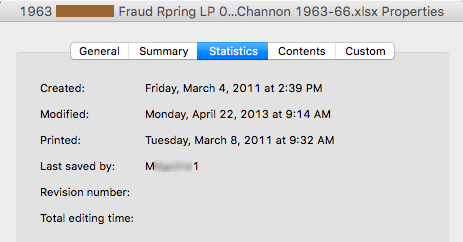
Look at this choice portion: Note who it says created it:
Yellow is government's star witness*, brown is victim*. I realize it's hard to trust that the contents match, but I'm not here to doxx the people involved. Everybody with access to this evidence knows who everybody is.
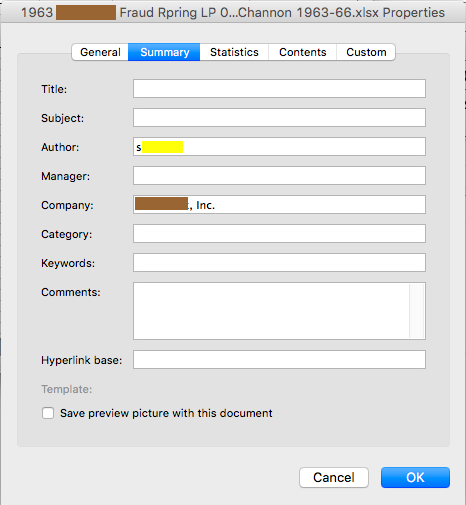
And then read the testimony, under oath, of the very same person, the government's star witness* on 1/11/16:
(Star witness* in yellow, defense attorney in blue, third-party contractor in purple:)
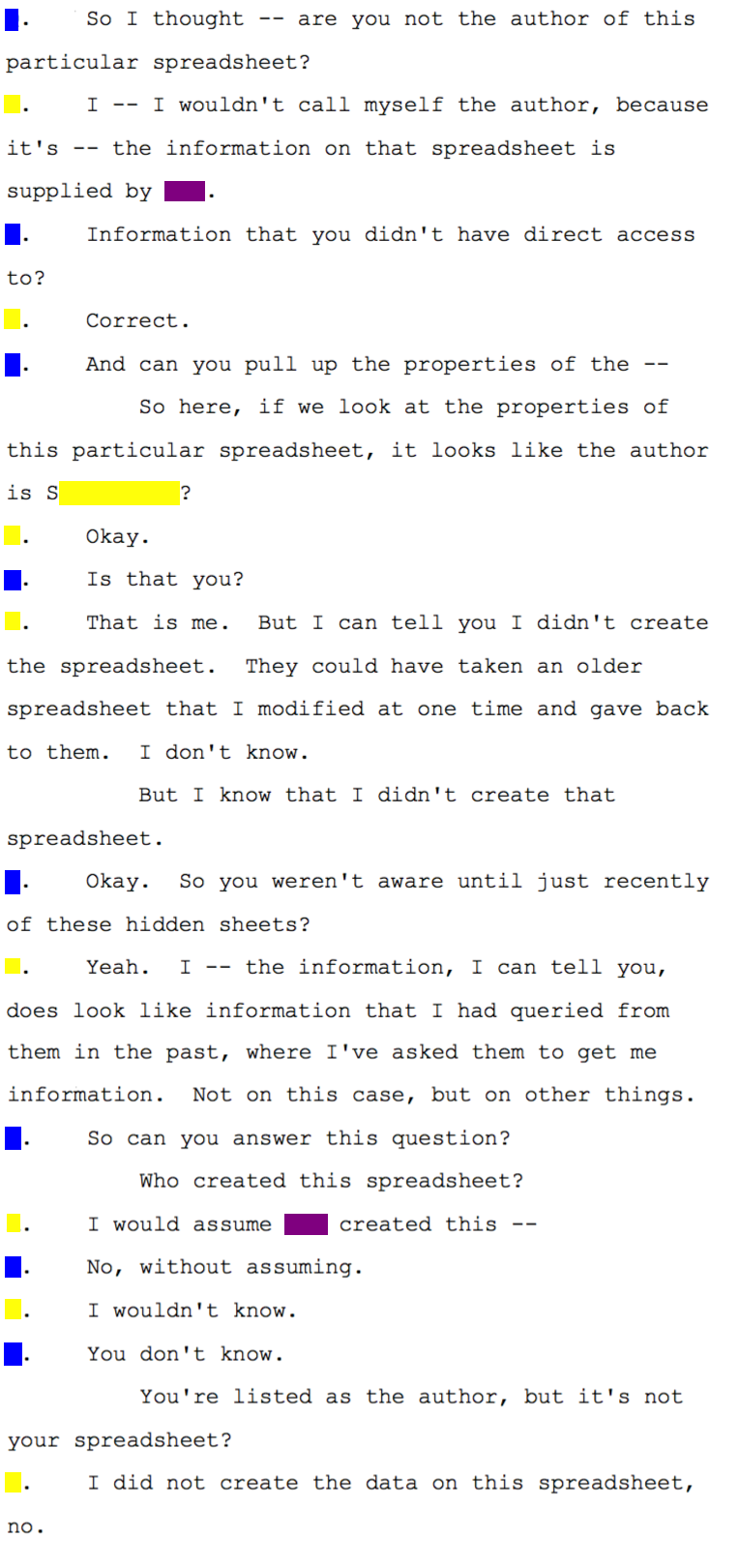
When you're the government's star witness*, lying under oath is just fine, because who are they gonna get to prosecute you?
Almost forgot. The LEAK. In this supposedly "original, authentic, computer-produced" document, there are 4-5 additional "hidden" tabs. On a couple of these tabs are thousands of rows of customer data.
(I unhid this tab, then blurred parts of this out):

What I gather happened is if you ever hand-filled in a membership agreement, they mailed it off to some cheap part of the world, and somebody hand-entered your scrawlings into the computer. The government's star witness* copy-pasted this data
for an unrelated case,
"somebody" hid the tabs, and I, this defendant with "propensity for self-serving conduct and artifice", was still apparently trustworthy enough to receive this sensitive information, not from a subpoena, but from the tiny subset of evidence
the assistant US attorney actually let us see.
Did I mention that the leaked customer information bounced back and forth, multiple times, between victim*, prosecution's star witness*, FBI agent, and prosecutor, in its preparation, with none of them aware of it? I know this because it was provided to the defense and I was the one who discovered it, and brought it to the attention of everyone. The victim* knew, the prosecution's star witness* knew, the FBI agents knew, the prosecutors knew, the judge knew, and nobody so much as batted an eye. Now you know too.
Not even so much as a "could you delete that please?"
Our side tried to tell the jury, but the judge shut that down. Day 4 of trial, 1/19/2016:
Sidebar between judge (black), prosecutor #4 (orange), and different defense attorney (blue), while the sound of static fills the courtroom, and the government's star witness* is on the stand:

And this LEAK, possibly with YOUR INFORMATION IN IT, is the very same document that the government has the gall to call an original!
You really should care about this document, because in addition to the leak, it's about to cost YOU YOUR 6th amendment rights.
Thank you for reading. If you like reading about my story, then maybe you'll appreciate this bonus track.
So what happens next? Well, when it comes to you, please reach out to your senators if applicable.
Got a journalist friend or an in with a popular blog? Hit me up.
I've thought long and hard about what's appropriate for me to do with regard to the leak, because you might like to know if you're on the list of leaked customers. Posting it, or some subset of it, would be wrong.
And then I got to thinking, wait, this is the FBI case agent's fault, let him deal with the public outrage. If you want to call him, to see if your information was leaked, let me know.
What happens next for me?
We roll the dice on a supreme court hearing.
We ought to hear by the end of the year whether they want to hear the case or not.
If not, it's off to prison I go for 10.5 months with good behavior.
The American public deserves to know what really happened. But you'd be amazed how few people want to report it.
Frequently Asked Questions
1. All you have to do is../The judge needs to hear.../The court needs to hear.../You should seek a mistrial.../re-trial.../get X to testify.../get the evidence thrown out.../suppressed...
I appreciate the legal advice, but the trial is over, done, finito, and has been for many years. Trust me, for every approach you think we should try, we tried it, plus 10x as many more. None worked, because the same people kept shutting us down. There is no re-trial, period. From here on out, short of a Supreme Court reversal, this highway robbery of a case is a done deal.
2. I want to play devil's advocate here.. according to this government propaganda website, you created tons of fake rewards accounts, which seems really fishy to me.
If it comes from the US Attorney's Office PR website (your tax dollars are necessary for PR why?) then it, like all content on the internet, must be true.
Seriously, the evidence they used to allege "tons of fake accounts" is at the very core of the challenge we're bringing to the Supreme Court. Did you know that if you want to use evidence in a court of law, the fact it comes "from a computer", without providing access to the opposing side, no matter how fishy it is (misspellings, copy and paste errors, no one knows who generated it, etc.), makes it "good enough" to consider it original and thus admissible?
That's not what the law says, but it is what a number of judges say. A frighteningly large number, all over age 60.
Never mind that I would have to be superhuman to have created that many accounts during the dates and times they argued. Like, creating accounts at the same time I'm also in a checkout line (on video), creating accounts on a commercial flight without wifi, and hopping between non-bordering states in minutes.
Even if I could somehow have broken the laws of time and space and created all those accounts, so what? Their accounts were free to create, had no intrinsic value, were the company's property, and were subject to revocation at any time.
If someone wants to justify punishing me for an actual crime, that's one thing. But I wish people would think a little harder before justifying punishing me for "looks suspicious".